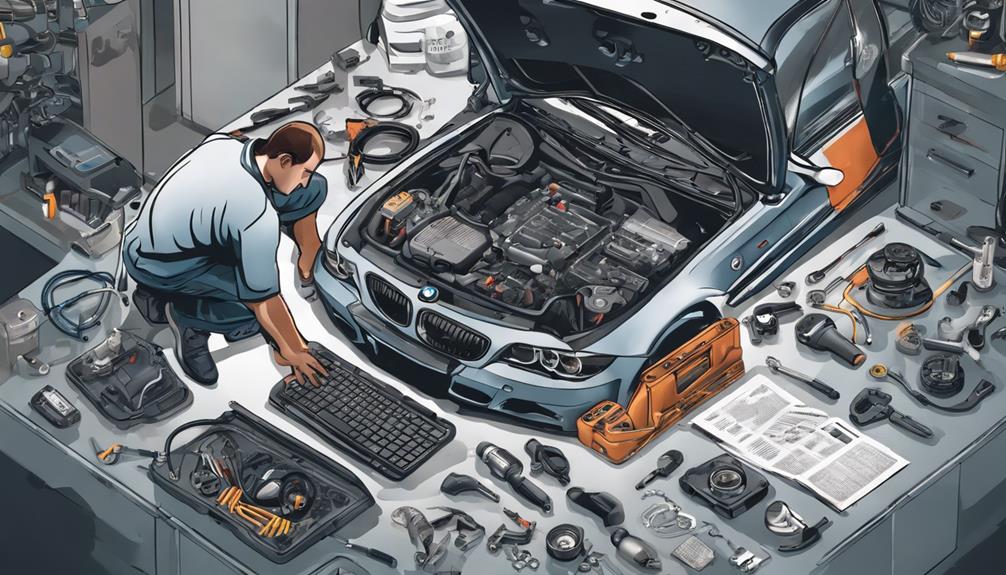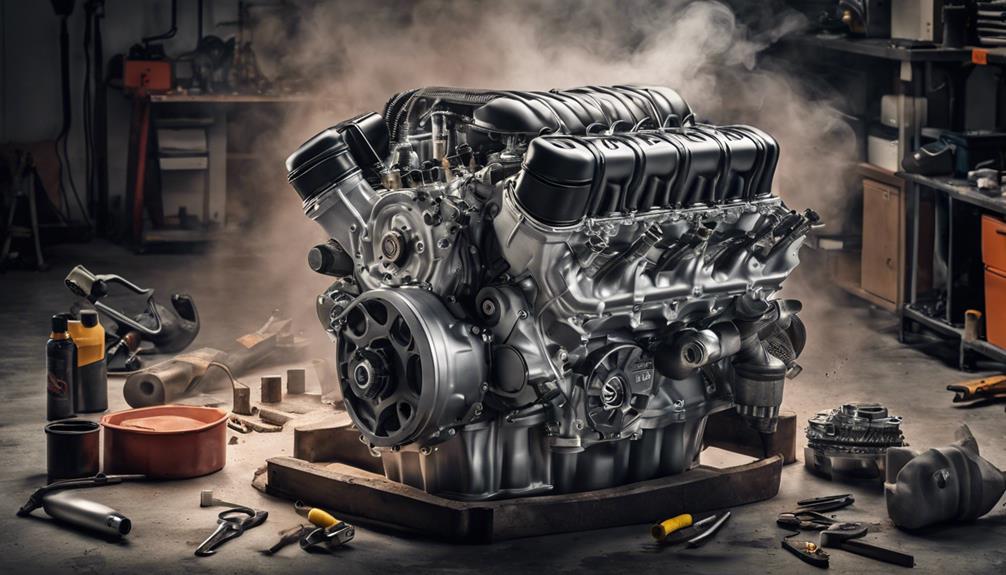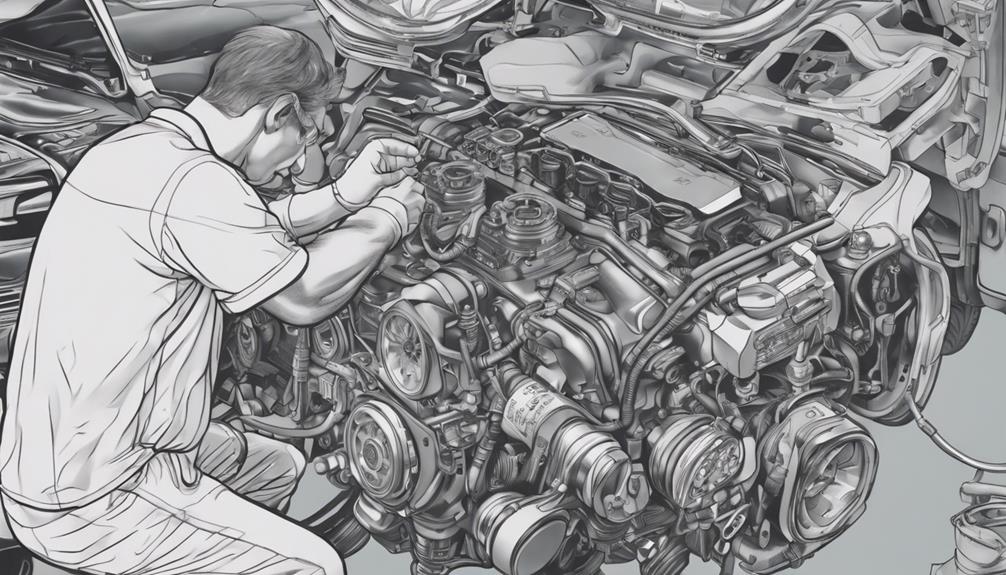If you're facing transmission woes in your BMW E60, tackle rough shifting and slipping gears by employing BMW ISTA/D and INPA diagnostic tools. Ignoring the signs may lead to bigger woes. Regular maintenance, including essential fluid changes, shields against potential valve sleeve leaks and failures. Stay informed on potential culprits like Mechatronics Assembly and pump system glitches. Remember to monitor fluid levels and adhere to service intervals to preserve peak performance. Seek expert advice from independent specialists for cost-effective repair solutions. Mastering mechatronics and forming a fluid friendship with your gearbox can steer you towards smoother drives.
Key Takeaways
- Regular maintenance crucial for transmission health.
- Monitor fluid levels and follow service schedules.
- Address warning signs promptly to prevent issues.
- Seek expert advice for diagnosis and repairs.
- Be proactive in preventing future transmission problems.
Common Signs of Transmission Problems

If you suspect transmission issues in your BMW E60, watch out for rough shifting, delayed engagement, and slipping gears as telltale signs of trouble. Your sophisticated E60 transmission, although a marvel of engineering, can sometimes throw a spanner in the works. These faults can be more frustrating than a teatime without scones. Ignoring these warning signs could lead to a right old mess under the bonnet.
When your E60 transmission starts acting up, it might even start speaking in fault codes, trying to tell you what's wrong in its cryptic language. Don't worry; you're not at Bletchley Park trying to crack the Enigma code. These fault codes, if deciphered timely, can pinpoint the exact gremlin causing mischief in your transmission system.
Diagnostic Tools for Identifying Issues
When it comes to diagnosing transmission issues in your BMW E60, having the right tools at your disposal is essential.
Common diagnostic tools like BMW ISTA/D can be your best ally in troubleshooting those pesky gearbox gremlins.
Common Diagnostic Tools
To explore the domain of diagnosing BMW E60 transmission issues effectively, one must equip themselves with the arsenal of BMW-specific diagnostic scanners like INPA and ISTA.
INPA, a beloved tool among BMW enthusiasts, allows direct access to various modules, including the transmission, aiding in fault code retrieval and sensor data analysis.
ISTA, on the other hand, serves as the all-encompassing diagnostic software utilized by BMW dealerships for in-depth transmission issue diagnosis. These tools delve into the transmission control module, revealing faults such as solenoid failures, valve body malfunctions, or sensor errors with precision.
With the right diagnostic tools at your disposal, unraveling the mysteries of your BMW E60's transmission becomes a technical adventure worth undertaking.
Troubleshooting Techniques
Equip yourself with the sophisticated diagnostic tools like BMW ISTA/D and ISTA/P to pinpoint and resolve transmission issues plaguing your BMW E60 with precision and efficiency. These tools provide access to fault codes, perform tests, and generate detailed reports on the health of your transmission. ISTA/D is your go-to for diagnosis and troubleshooting, while ISTA/P handles programming and coding functions.
Regular updates from BMW keep the ISTA software sharp and up-to-date, ensuring peak diagnostic capabilities for newer models. With these tools at your disposal, troubleshooting E60 transmission problems becomes a breeze.
- Utilize BMW Forums for shared experiences and solutions.
- Archive diagnostic reports for future reference.
- ISTA/D for diagnosis, ISTA/P for programming.
- Regularly update ISTA software for enhanced capabilities.
Importance of Regular Maintenance

Regularly maintaining your BMW E60 transmission is a non-negotiable aspect of vehicle ownership to avert potential costly issues down the road. Neglecting transmission maintenance, including essential fluid changes every 50,000 to 75,000 miles, is akin to inviting a mischievous gremlin to wreak havoc within your vehicle's mechanical sanctum. By heeding the call of regular maintenance, you not only uphold the sanctity of your transmission but also gain the upper hand in identifying any budding issues before they blossom into wallet-draining catastrophes.
Adhering to the manufacturer's prescribed maintenance schedule for your transmission is akin to following a secret recipe for automotive longevity and performance. Ensuring your transmission is well cared for through routine maintenance can act as a shield against the malevolent forces of valve sleeve leaks and mechatronics failures, saving you from the torment of costly repairs and preserving the harmony of your driving experience. Remember, a stitch in time – or a fluid change when due – saves nine!
Potential Causes of Transmission Failure
Neglecting the maintenance of your BMW E60 transmission is akin to providing a welcoming invitation for potential transmission failures to wreak havoc on your driving experience. Remember, prevention is always better than a hefty repair bill later on. Here are some potential causes of transmission failure to keep an eye on:
- Mechatronics Assembly: This intricate system controls various transmission functions. Failure can lead to harsh braking, indicating a replacement may be needed.
- Valve Body: Issues like sticking valves or worn valve sleeves can cause leaks and impact gear shifts. Keep this component in top shape.
- Solenoids: Malfunctions in these components can disrupt gear engagement and lead to rough shifting. Don't underestimate their importance.
- Pump System: Problems here, such as failure or inefficiency, can affect fluid pressure and lubrication. Make sure your pump system is operating at its best to avoid transmission woes.
Stay informed and vigilant to enjoy smooth drives in your BMW E60!
Tips for Preventing Future Problems

To maintain the peak performance of your BMW E60 transmission, adhere to these essential preventive measures.
First and foremost, keep a vigilant eye on your transmission fluid levels. Low levels can lead to overheating and premature wear, so make sure they're always within the recommended range.
Next, don't overlook the importance of following the manufacturer's transmission service intervals. Regular fluid changes and filter replacements are vital in keeping your transmission running smoothly.
Additionally, inspecting and replacing worn-out components like solenoids and gaskets can help prevent potential failures down the line.
Avoiding rough driving behaviors such as sudden acceleration and heavy towing is also crucial in preserving the health of your transmission system.
Repair Options for BMW E60 Owners
So, you're facing those pesky E60 transmission gremlins, eh? Fear not, for there are options aplenty for your noble steed.
From simple DIY fixes for sticking valves to the more sophisticated valve body reconditioning and solenoid replacements, you've got choices like a proper British tea selection.
Whether you fancy a bit of tinkering or prefer leaving it to the specialists, the world of E60 transmission repairs beckons with solutions galore.
Common Repair Issues
If you're a BMW E60 owner facing transmission troubles, exploring repair options for common issues like mechatronics failures and sticking valves can be a challenging yet essential task.
When dealing with these problems, consider the following:
- Regular fluid changes every 50,000 to 75,000 miles can help prevent transmission issues in ZF transmissions.
- Repairing sticking valves in the valve body can be a cost-effective solution at around $40.
- Dealers might require fault codes to acknowledge mechatronics problems, but replacement, although expensive, can be effective.
- Seeking advice from experienced BMW mechanics is crucial, as some customers have had transmission problems resolved under warranty.
Navigating these repair options smartly can help keep your BMW E60 running smoothly.
DIY Fixes Available
For BMW E60 owners seeking to tackle transmission issues themselves, consider exploring DIY fixes readily available for addressing common problems. When it comes to maintaining your E60's transmission, a simple task like a transmission fluid change can work wonders.
Regularly changing the transmission fluid, around every 50,000 to 75,000 miles, can help keep your gearbox running smoothly and prevent potential headaches down the road.
Additionally, addressing sticking valves in the valve body is another common DIY repair that can save you some pounds, costing around $40 to fix.
Professional Repair Services
When grappling with transmission woes in your BMW E60, exploring the world of professional repair services offers a spectrum of solutions to address these intricate mechanical dilemmas. Whether you opt for the prestige of a dealership or the individual touch of independent specialists, there are choices aplenty for your BMW E60's transmission troubles.
Here are some pointers to guide you through this maze:
- Consider Independent Specialists: They often provide more cost-effective solutions.
- Expertise Matters: Specialized BMW repair shops boast technicians well-versed in E60 transmission issues.
- Personalized Attention: Independent specialists may offer tailored service and faster repair times.
- Seek Recommendations: Join the BMW E60 5-Series Forum for valuable insights on reputable repair services.
Navigate the world of professional repair with confidence and get your BMW E60 back on the road swiftly.
Cost Estimates for Transmission Repairs
To gauge the potential expenses involved in rectifying BMW E60 transmission problems, explore the world of cost estimates for transmission repairs. When facing transmission repair issues on your BMW E60, the price tag can often cause a frown. However, fear not, as there are ways to tackle these costs without breaking the bank. Check out the table below for an estimate of what you might expect when dealing with transmission repair, including the replacement of the mechatronics sleeve and other components:
| Repair Component | Estimated Cost ($) |
|---|---|
| Mechatronics Sleeve | $400 – $800 |
| Tubular Sleeves | $100 – $200 |
| Valve Body Reconditioning | $300 – $500 |
| Solenoid Replacement | $200 – $400 |
| Labour Costs | $300 – $600 |
Expert Advice on Handling Transmission Issues

Consider consulting experienced BMW technicians or engaging with online automotive communities for astute guidance in managing transmission issues with your BMW E60. When it comes to tackling transmission problems, expert advice can be invaluable.
Here are some tips to help you navigate through these tricky waters:
- Mechatronics Mastery: The mechatronics assembly is the brain behind ZF transmissions; understanding its functions can shed light on mysterious bumps.
- Fluid Friendship: Regular fluid changes every 50,000 to 75,000 miles can keep your transmission purring like a satisfied cat.
- Dealer Dance: Dealers may need fault codes to diagnose issues, so arm yourself with knowledge and persistence.
- Community Charm: Joining online forums can connect you with fellow BMW enthusiasts who may have faced and conquered similar transmission woes.
Conclusion and Final Recommendations
In concluding your journey through the world of BMW E60 transmission issues, let's explore some final suggestions to guarantee your driving experience stays seamless and your wallet intact. To keep your E60 transmission purring like a contented kitten, regular maintenance is key. However, if you encounter mechatronics assembly woes, especially those pesky deteriorating valve sleeves causing harsh braking bumps, fear not! Repairing sticking valves in the valve body need not break the bank, with a fix costing around a mere $40. Seeking counsel from seasoned BMW mechanics and tapping into online forums like vBulletin can provide invaluable wisdom when troubleshooting E60 transmission tribulations. For the intrepid DIYers amongst you, fear not to investigate into your transmission, as armed with knowledge, you could save a pretty penny on repairs. Remember, a little care goes a long way in maintaining your BMW's transmission health.
| Final Recommendation | Description |
|---|---|
| Regular Maintenance | Keep your transmission happy with routine checks and services. |
| Online Forums | Seek advice and solutions from experienced enthusiasts on platforms like vBulletin. |
| DIY Repairs | Save on costs by tackling minor repairs yourself with the right guidance. |
| Mechatronics Sleeve | Keep an eye on these to prevent harsh braking issues and ensure smooth driving. |
Frequently Asked Questions
What Is the Transmission Problem With the BMW 5 Series?
When facing transmission issues in your BMW 5 Series, seek guidance from skilled mechanics. Regular maintenance, like fluid changes every 50,000 to 75,000 miles, can prevent costly repairs. Don't ignore warning signs for smooth driving.
How Do I Know if My BMW Transmission Is Bad?
If your BMW transmission is bad, you may notice rough shifting, strange noises, or burning smells. To confirm, use diagnostic tools to scan for error codes. Consult a skilled technician for a thorough inspection.
How Do You Reset the Transmission Fault on a BMW E60?
To reset the transmission fault on your BMW E60, utilize diagnostic tools like INPA or ISTA for precision. Disconnecting the battery for 30 minutes may work but is less accurate. Address the root cause first to avoid recurring issues.
What Kind of Transmission Is in the BMW E60?
In the BMW E60, you'll find a 6-speed automatic transmission known as the GM 6L45. This transmission, a collaborative effort between General Motors and BMW, delivers smooth shifting and efficiency, ensuring peak performance for your driving pleasure.
Conclusion
So, if you find yourself facing transmission troubles with your BMW E60, don't fret. With the right diagnostic tools, regular maintenance, and expert advice, you can tackle these issues head on.
Remember, prevention is key, so make sure to follow the tips provided to avoid future headaches. And if all else fails, know that there are repair options available to get your transmission back in top shape.
Keep calm and drive on, old chap! Cheers!









